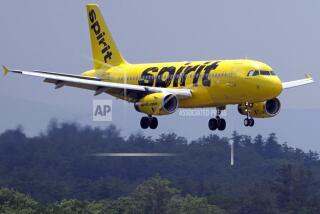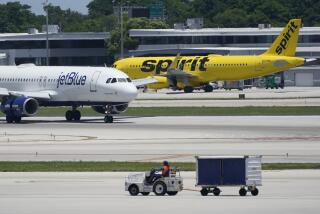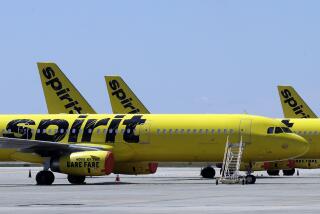United Denied Federal Bailout
- Share via
A United Airlines bankruptcy filing became almost certain Wednesday when a federal panel rejected a $1.8-billion government loan guarantee that the carrier needed to avoid running out of cash this winter.
Despite United’s furious efforts in recent weeks to line up $5.2 billion in labor cost savings to win approval of the bailout, the Air Transportation Stabilization Board described the airline’s recovery plan as “not financially sound” and said it would not put taxpayers’ money at risk.
Even with the loan backing, “United would face a high probability of another liquidity crisis within the next few years,” the ATSB said. The board was created after last year’s terrorist attacks to judge which airlines could tap $10 billion in guarantees that were part of the industry’s post-Sept. 11 aid package.
“We are disappointed,” said Glenn Tilton, chief executive of United and its parent, UAL Corp. “We will consult with our union leaders and other stakeholders and quickly determine what step to take next.”
United -- the second-largest U.S. airline behind American and the biggest operator at the Los Angeles and San Francisco airports -- has said it would file under Chapter 11 of the bankruptcy laws without the loan guarantee. If so, it would mean that two of the seven largest U.S. airlines would be operating under bankruptcy protection. US Airways filed under Chapter 11 in August.
“This is the final nail in the coffin -- United will have to file for bankruptcy and probably very quickly,” said analyst Philip Baggaley of credit-rating firm Standard & Poor’s.
As with US Airways, United’s passengers would not see major changes immediately, because a company keeps operating under Chapter 11 while it attempts to reorganize.
“Nobody over the Christmas season is going to be significantly impacted,” said Ron Kuhlmann, vice president of Unisys R2A, an aviation consulting firm.
But he and other analysts said the longer-term effect of a United bankruptcy filing on the airline industry would be profound.
United, the dominant airline for both business and leisure travel only a few years ago, would probably make sharp cuts in its flight schedule as creditors demand that the carrier scale back to conserve cash. Passengers might start booking away from United, fearing that the Elk Grove Village, Ill.-based airline is too unsettled. Many of United’s 80,000 jobs -- including some of the 6,500 in Southern California -- would be in jeopardy, and its union contracts could be scrapped.
A bankruptcy filing also is likely to leave UAL’s stock practically worthless and put an end to United’s journey through employee stock ownership. The carrier is the nation’s largest employee-owned company, with workers controlling 55% of the shares. Before the ATSB announcement, UAL’s stock rose 7 cents a share to $3.12 on the New York Stock Exchange.
“These are hard decisions, and I certainly feel for the affected employees,” Edward Gramlich, one of the ATSB’s three members, said in a statement. “At the same time, the loan board has a responsibility to taxpayers, and to fostering the longer-term health of the airline industry.”
Gramlich, a Federal Reserve governor, and Treasury Undersecretary Peter Fisher rejected the airline’s request. The third member, Transportation Department General Counsel Kirk Van Tine, deferred his vote until Monday, but his vote is now moot. Daniel Montgomery, the ATSB’s executive director, said United could reapply for a loan guarantee but as part of a Chapter 11 reorganization.
A United bankruptcy filing could eventually ripple across California. Airports in Los Angeles, Orange County, Burbank and Ontario account for more than 140 of United’s 1,775 total daily flights. Many of United’s most heavily traveled routes involve connections between Los Angeles, San Francisco, Chicago and Denver.
Nationwide, the airline also might slash fares -- at first to keep generating income -- and that would force other major airlines to take similar actions to stay competitive. But if United gets its costs under control, the carrier and its rivals might push fares back up again, some analysts predict.
“Clearly, United will have to drastically downsize in a Chapter 11,” said Kevin Mitchell, chairman of the Business Travel Coalition, an advocacy group that had urged the ATSB to approve the loan guarantee. “This decision will put at significant risk the interests of the consumer, United Airlines’ employees and the economy.”
United’s viability probably would affect other U.S. companies. Indeed, Walt Disney Co. said Wednesday that a United bankruptcy filing might force it to write down a $114-million leveraged investment in the carrier’s aircraft leases.
Rusty Hammer, president of the Los Angeles Area Chamber of Commerce, said the decision was a blow to the region’s economy and tantamount to “letting the terrorists win, because their objective was to disrupt America and its economy.”
But many others have argued that United’s management and unions, two sides that have been at odds for years, have only themselves to blame.
Such critics contend that the Sept. 11 attacks -- which involved two hijacked United jetliners -- and the subsequent drop in air travel exacerbated structural problems that already were eroding United’s position. They also maintain that United and its unions should have addressed the problems long before the ATSB was established.
Management missteps included spending a year pursuing a $4.3-billion merger with US Airways, only to have it scuttled in the face of antitrust concerns. And the pilots and mechanics unions, which hold seats on UAL’s board of directors, won new contracts that made United’s labor costs among the highest in the industry just as travel -- especially lucrative business travel -- was slumping.
UAL, which lost an industry record $2.1 billion in 2001, lost an additional $1.7 billion in the first nine months of this year and is still spending about $5 million more than it receives in revenue every day.
One harsh critic of a United loan guarantee is Continental Airlines, itself a survivor of Bankruptcy Court. “The U.S. government did the right thing for the taxpayers and for competition by letting the marketplace determine winners and losers,” Continental said Wednesday.
The ATSB has been stingy in awarding loan guarantees. In rejecting United’s bid, the panel said that the airline’s recovery plan -- even with its proposed labor savings -- would be insufficient “to achieve long-term financial stability” and that United’s revenue projections were “unreasonably optimistic.”
United had asked the ATSB to back $1.8 billion of a $2-billion loan it would have obtained through conventional lenders. If United defaulted, the federal government would be responsible for covering the loan with taxpayers’ money.
Fisher, the other ATSB member who voted against United, said, “This is not just about costs, it’s about a business plan that is fundamentally flawed.”
Under Tilton, who has been CEO for only three months, United raced to line up wage concessions from its pilots, mechanics and flight attendants to get the loan secured before its cash crunch became too severe. United faced debt payments of $920 million on Monday, but it invoked grace periods to get a few days’ breathing room to complete its agreements with the unions.
United’s pilots and flight attendants ratified their concessions, and the International Assn. of Mechanics was scheduled to vote again today on their $700-million portion of the givebacks. But the mechanics canceled the vote Wednesday night because it “would be pointless,” union President Tom Buffenbarger said in a statement.
Union leaders decried the ATSB vote.
“We are extremely disappointed by the decision ... and do not agree with the board’s analysis of United’s business plan nor the timing of its announcement,” Paul Whiteford, head of the United chapter of the Air Line Pilots Assn., said in a statement.
Greg Davidowitch of the Assn. of Flight Attendants said the ATSB vote was “not just disappointing, it’s irresponsible. And we call on the ATSB to reconsider United’s application.”
*
How a United Airlines bankruptcy protection filing could affect consumers:
What should consumers expect now that United Airlines’ request for a $1.8-billion government loan guarantee has been rejected?
Question: What happens if it files for Chapter 11 Bankruptcy Court protection?
Answer: United gains protection from its creditors but loses control of its restructuring and its stock is almost certain to become worthless. A Bankruptcy Court judge can order steeper cutbacks than the ones already proposed by United, and alter or even dissolve its labor and other contracts; the employee stock ownership plan also could be scrapped.
Many of United’s 80,000 jobs could be affected. The airline employs about 6,500 in Southern California alone.
Q: Will the carrier stop flying?
A: United has pledged to keep operating its normal schedule during bankruptcy protection, just as US Airways has been doing since it filed for Chapter 11 in August. “In the short run, this doesn’t need to affect travelers at all,” said Darrell Jenkins, head of George Washington University’s Aviation Institute.
Q: Will frequent-flier miles be affected?
A: Experts say they probably are safe. Frequent-flier programs are one of the airlines’ best marketing tools and unlikely to be suspended even in Bankruptcy Court. It’s possible the programs could be tightened to require more miles. Even if United were to go out of business in the future, a competitor would probably step in and honor 25% to 50% of the miles to try to create loyal new customers.
Q: How would a bankruptcy filing affect United and its passengers over the longer term?
A: To shrink its capacity in a bid to become profitable again, United may ground more planes, drop service to some markets, eliminate unprofitable international routes and reduce the number of cross-country flights.
That could be especially true at Los Angeles International Airport, other Southern California airports and San Francisco International Airport, where United is a major player.
Q: What are the odds of United surviving a bankruptcy filing?
A: Uncertain. Continental Airlines, America West and others survived bankruptcy filings; Eastern, Pan Am and Midway didn’t.
“If they make peace with labor, they will come out of Chapter 11 stronger than they’ve ever been. If they have any travel disruptions due to labor unrest, then they become the next Eastern Airlines,” Jenkins said.
Source: Times Staff and Wire Reports
More to Read
Inside the business of entertainment
The Wide Shot brings you news, analysis and insights on everything from streaming wars to production — and what it all means for the future.
You may occasionally receive promotional content from the Los Angeles Times.











